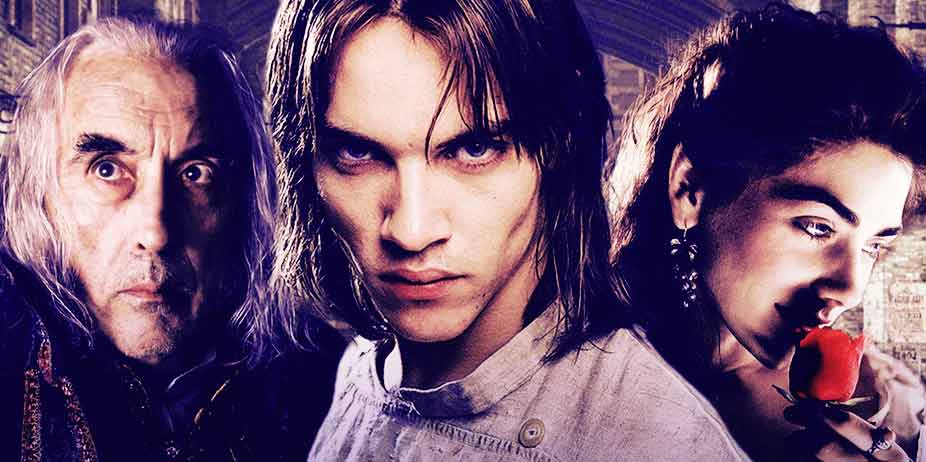
Gormenghast (2000)
Based on the best-selling book series by Marvin Peake, this miniseries features a superb cast of characters and a dark, moody, sinister undertone as it follows the exploits of a treacherous kitchen boy socially climbing into a position of power and influence with the Groan family.
The Groans have ruled Gormenghast for centuries and will continue to do so, come hell or high water. The latest unattractive Groan is the violet-eyed, most hideous baby anyone has ever seen -- Titus. His birth is of no interest to his mother, Lady Gertrude (Celia Imrie), who tells Nanny (June Brown) to bring him back when he's six and returns her attention to her white rook, Mr. Chalk. It angers his older sister Lady Fushia (Neve McIntosh), who doesn't want a baby brother -- until she discovers he's been dropped on his head and is ugly, then she's quite in love with him. And it is welcome but shocking news for Lord Groan (Ian Richardson), who in his delicate mental state welcomes this happy news before returning to the books in his beloved library. The happy event (to some) coincides with the escape of Steerpike (Jonathan Rhys-Myers) from the kitchens; an abused and unwanted, bitter young man, he hopes for better things and tries to convince Lord Groan's faithful servant Flay (Christopher Lee) to find him a position upstairs. A man of few words but utter dedication to the castle and its inhabitants, Flay swiftly dislikes and distrusts him and sends him on his way.
Through cleverness, Steerpike manages to endear himself to Lady Fushia, who then takes him across the lane to the home of Dr. Prunesquallor (John Sessions) and his unhappy spinster sister (Fiona Shaw). He finds employment there and unbeknown to one and all, plots to bring the Groan family to its knees, with the assistance of Lord Groan's half-wit sisters Cora and Clarice (Lynsey Baxter, Zoe Wannamaker). As he lays his diabolical plans and cracks begin to appear in the ancient traditions of Gormenghast, only one soul will eventually have the discernment to stand against him -- the most hideous violet-eyed child.
Having never read the books, it took a few years for me to get into this story -- I had tried watching it after its initial release and it was a bit too absurd for my taste, but recently indulging in Pratchett and learning the humor to be derived from utter foolishness, Gormenghast was far more enjoyable this go-around. It is not for everyone, however... its sense of humor is often quite wicked and there is a lot of darkness to be found in this castle, however absurd its characters. By the final episode the villain is dancing about with corpses and not all the main characters make it to the end. But it does have some wonderful moments, serious conversations that have real emotional impact on the audience -- one of them is the horrific scene in the garden in which Lord Groan suddenly asks who his daughter is. The ensuing conversation is both touching and heart-wrenching as we realize that his mind is quite gone.
The final hour also has a twist that places Steerpike in a mask and whether deliberately or unintentionally, from that moment on I was having flashbacks to The Phantom of the Opera and its evil but tragic protagonist. He is both a horrific and quite mad villain, but also one that in moments encourages your sympathy. Of course, the insanity is nothing new -- everyone in the castle is in some way insane, which leads to some truly hilarious moments. One of the finest things is the cast -- you have a range of superb actors that later on include Stephen Fry as an overly sleepy professor at the half-rate school, but the seriousness with which they take these characters is magnificent. Richardson attacks Lord Groan with the dedication most actors put into King Lear, while Myers impressed me with his subtleties in the second half.
The antics and humiliating events here are worthy of Shakespeare, while the darkness and dramatics remind me much more of Dickens. It is part satire, part humor, part demented genius and quite frankly, unlike anything I have ever seen before. You need a slightly twisted sense of humor to enjoy it and I suspect you will know within ten minutes or not whether this is the miniseries for you.
Sexual Content:
In the first episode, we see the nipple of a wet nurse; in the third, a naked man runs through the garden (several long shots of backside nudity). Titus is passed a risqué drawing of intercourse. Sexual references; a naked baby boy; quick side shots on a naked woman.
Language:
Frequent, the worst of it being "bloody bastard" (one of the professor's favorite phrases); the secretary is always screeching "hell."
Violence:
Gruesome, dark implications of dropping babies on their heads (unseen) to the murderous intentions of the staff. (The cook takes after Mr. Flay with a butchering mallet!) A man has his ear cut off; people fall to their deaths out of windows; a man is stabbed with a knife and set on fire (he grabs another man and tries to burn them both alive); a character commits suicide by drowning; two people are stabbed in the neck and die; a monkey accidentally has its tail cut off; a cat is thrown across a room. We see skeletal corpses, implying two women starved to death.
